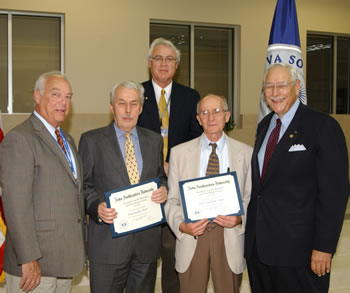An Investigation into the Effects of Low Intensity Laser Therapy on Conduction Velocity and Amplitude of Large Diameter Myelinated Sensory Fibers of the Median Nerve and its Correlation with Current Perception Threshold in Normal Subjects
Grant Winners
- Paul Bradley, M.D. – College of Dental Medicine
- Neil Spielholz, Ph.D. – College of Dental Medicine
- Yuri Zagvazdin, Ph.D. – College of Medical Sciences
Deans
- Robert Uchin – College of Dental Medicine
- Harold Laubach – College of Medical Sciences
Abstract

Purpose: Low intensity laser therapy (LILT) is claimed to reduce the pain of myofacial and neuropathic origin. The mechanism of this action, however, is unclear. One possibility is that photonic energy of the laser beam alters the "sensitivity" of nerve fibers, thereby reducing the sensation of pain. A second possibility is that laser therapy reduces inflammation, thereby reducing pain. To test the first possibility, we propose performing two types of electroneurophysiogical investigations, before and after exposure to 2 laser "treatments" that we commonly employ in our Orofacial Pain Clinic.
Methods and Data Analysis: Twenty normal subjects will be studied twice, at least one week apart. Continuous wave laser (820 nm) will be applied over the median nerve in the palm on one occasion, while pulsed laser (2.5 Hz) will be used the second time. The sequence will be determined randomly for each subject. Two routine non-invasive electrophysiological techniques, before and after LILT, will be used for outcome measures: 1) antidromic sensory nerve action potentials (SNAPs) will be recorded from index finger in response to stimulation of the median nerve at the wrist and, 2) current perception threshold (CPT) testing of the index finger will be performed using the standard 2000 Hz, 250 Hz, and 5 Hz sinusoidal frequencies. These frequencies stimulate selectively A-beta fibers, A-delta fibers, and C fibers, respectively. These data will permit us to determine whether a significant change in conduction velocity and/or current perception threshold occurs following 820 nm LILT, and also whether any correlation exists between the changes in conduction velocity and current perception threshold to the 3 different sine wave frequencies.
Significance of Study: This study should help elucidate how LILT may reduce the sensation of pain, and also whether LILT selectively or non-selectively affects different classes of sensory nerve fibers (if it affects nerve fibers at all).